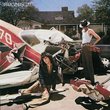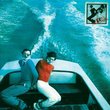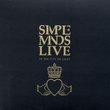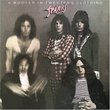| All Artists: Sparks Title: Big Beat (Mlps) (Shm) Members Wishing: 5 Total Copies: 0 Label: Universal Japan Original Release Date: 1/1/2009 Re-Release Date: 5/26/2009 Album Type: Import Genres: Dance & Electronic, Alternative Rock, Pop, Rock, Classic Rock Styles: Disco, Hardcore & Punk, New Wave & Post-Punk, By Decade, 1970s, Glam Number of Discs: 1 SwapaCD Credits: 1 |
Search - Sparks :: Big Beat (Mlps) (Shm)
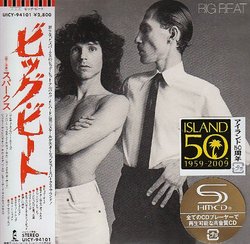 | Sparks Big Beat (Mlps) (Shm) Genres: Dance & Electronic, Alternative Rock, Pop, Rock, Classic Rock Japanese only SHM paper sleeve pressing. The SHM-CD [Super High Material CD] format features enhanced audio quality through the use of a special polycarbonate plastic. Using a process developed by JVC and Universal Music J... more » |
Larger Image |
CD DetailsSynopsis
Album Description Japanese only SHM paper sleeve pressing. The SHM-CD [Super High Material CD] format features enhanced audio quality through the use of a special polycarbonate plastic. Using a process developed by JVC and Universal Music Japan discovered through the joint companies' research into LCD display manufacturing* SHM-CDs feature improved transparency on the data side of the disc* allowing for more accurate reading of CD data by the CD player laser head. SHM-CD format CDs are fully compatible with standard CD players. Similar CDs
|
CD ReviewsSparks find their heavy sound, with mixed results. CD master Movie fan from another galaxy | 01/09/2007 (4 out of 5 stars) "Please Note: This review is of the 2006 remastered version of Big Beat. One track (Throw her away And Get A New One) has a technical glitch created during remastering and ends prematurely. All other previously released versions of Big Beat play normally. The rating of four stars is for an otherwise beautiful job of remastering + the bonus tracks, a nice booklet and of course the original tracks which appeared on Sparks wonderfully quirky 1976 release - Big Beat. Having conquered England's shores circa 73-75 riding the crest of "This Town Ain't Big Enough For Both Of Us", California born anglophiles Ron and Russell Mael packed up and moved back stateside for further dalliances with pop stardom. Their second attempt (first being 2 rare yet exquisite records from 72-73) to capture the whims of U.S. audiences was '76's "Big Beat" produced by Rupert Holmes who would much later score with bar favorite "Pina Colada" (the song, not the drink). Having now orchestrated their relocation back to the U.S., Sparks then proceeded to hire a new band for this outing. After first recruiting Ziggy's sidekick Mick Ronson who began rehearsals but then dropped out due to scheduling conflicts, the Mael boys finally settled on guitarist Jeff Salen formerly of Tuff Darts. Already on board were sometime Roxy Music bassist Sal Maida and session drummer Hilly boy Michaels. The new three piece guitar, bass and drum driven sound surprisingly, often relegates Ron's keyboard flourishes deeply back in the mix. And likewise doing away with what had been a Sparks trademark of complex, soaring queen-like arrangements and multi-part harmonies. Big Beat explores a more simple, heavy, straight forward and basic rock sound in great contrast to their previous bombastic, falsetto hyper-drive displayed gloriously with great effect on previous efforts: "Kimono My House", "Propaganda" and "Indiscreet". Big Beat was to be Sparks's reintroduction to their American audience and was intended to jumpstart their conquest on the American pop charts. But while the Sparks "brothers" had been busy tapping into the brit-pop glam bubbling across the pond, the American audiences were now drinking heavily of the disco de-light. With Donna Summer, the BeeGees and the like topping the charts with their dance oriented studio 54 sound, the Sparks sparse guitar driven pop could not make a ripple inching only minimally onto FM hard rock stations where favorites Peter Frampton, Boston and Pink Floyd ruled the air. 30 years on, Big Beat now rests comfortably between Sparks triumphant 3 minute whirling dervish pop days and their then soon to be forthcoming New Wave electronic soaked reincarnation beginning with '79's "Number One Song In Heaven" This newly remastered CD captures the Maels in all their stripped down glory, spotlighting "Big Boy", "Fill-er-Up" (both ably played on the big screen in 76's disaster-pic "Rollercoaster" which must be seen if only for Ron Mael's on-stage demolition of his piano stool ala Pete Townsend), "Nothing to Do", "I Want to Be Like Everybody Else" and FM fave - "Everybody's Stupid". However a technical glitch in "Throw Her Away And Get A New One" causes a premature and abrupt ending, thereby ruining one of the best songs on the album. This was not just a simple skip, which may be attributable to my receiving a defective disk, but is inherent in the mastering. I have not yet tried to return it, but would be curious to know if Island Records is planning on recalling this disk. On the plus side, the six additional tracks make this CD even more fun as "Intrusion/Confusion" and "Looks Aren't Everything" are being released for the first time. Intrusion...being a pre Big Beat version of "Confusion" that was written for French director Jasques Tati's un-named film which, sadly was never completed. This version is a bit more rumba-like and sheds a whole new light on the song. In addition there is a slick 10 page booklet with plenty of photos, 45 cover shots, lyrics and enlightening commentary by Daryl Easlea. Big Beat marked a distinct musical departure for the Mael's and like many style breaking leaps, it failed on many levels, not the least of which was popular appeal. But while the sound did not take hold in the pre-punk American ears, the songs still hold up well and stayed true to the Mael boys propensity for off-handed lyrical jaunts and unexpectedly vaudevillesque-like song structures. That 1976 era Sparks attribute has remained their true calling card and what keeps them still vital in the overcrowded yet oft-underwhelming cavalcade of pop music. " This is a KILLER rock album, if you can find it, BUY IT!!! Gordon M. Wagner | Suburbia | 04/02/2005 (5 out of 5 stars) "Truly brilliant, original and beautifully produced, this album seemed to vanish instantly. They played a big show @ the Long Beach Arena back in '76 on New Year's Eve but got NO airplay, EVER... I *LOVE* this album. Funny, acerbic lyrics, incredible playing -- it's a nearly perfect rock album that should have been a huge success!!! I wanna be I wanna be I wanna be like everybody else Be like everybody else, be like everybody else Gravity don't work on me! I want to be like everybody else... BUY THIS ALBUM!!! PS -- some kind soul pointed out that I am mistaken about the Sparks show being @ Long Beach, it was in Santa Monica! And VAN HALEN opened!!!" Terrific album, but less would have been more Rutabaga | 10/17/2009 (4 out of 5 stars) "After a series of releases that enjoyed chart success in Europe and especially England, "Big Beat" was Sparks' attempt to crack the US market with a stripped-down rock-and-roll sound. In spite of a lot of folks saying this was a departure for the Mael brothers and their (all new, in this case) backing band, "Big Beat" is not substantially different from their classic mid-1970's output, just leaner & meaner. I like this album a lot, especially the sound of the recording itself-- very clean, dry and round (listen to the samples and see what I mean), and each instrument-- drums, bass, guitar, and keyboards (primarily piano) and Russell Mael's vocals all have ample space and breathing room. Kudos to producer Rupert Holmes (yes, the same guy who later did "The Piña Colada Song") for such a feat-- and big ups to Sparks' new backing band, particularly to occasional Roxy Music bassist Sal Maida, who turns in a great effort with wonderfully fluid playing. Russell Mael's vocals also deserve mention-- his famous falsetto gets a bit of a rest on "Big Beat," and listeners can get a great listen to his very dynamic vocal range. The care taken by Island records to remaster this album is evident and has paid off well, and this 1976 release sounds terrific even by today's standards.
The song material is typical Sparks, though perhaps slightly more toned down than in previous albums: great ideas, delightfully clever turns of phrase, and of course lyricist Ron Mael's continued mining of willfully weird and funny subject matter and skewed look at mundane life. I personally believe that it is the left-of-center lyrics that have kept Sparks out of the charts and away from radio programmers playlists-- somehow along the way, Sparks were tagged as a novelty act more suited for Dr. Demento's show than heavy rotation on "mainstream radio"-- and that's a shame. There are countless love songs out there, but precious few that chronicle simple boredom but still kick arse ("Nothing To Do" all but roars out of the speakers). These guys deserve far better than the small but feverent cult they enjoy to this day. Despite the great remastered sound and the fact that this is a strong cohesive album, I do have a few minor quibbles. The bonus material-- in this case, the final 6 tracks-- is noticeably weaker than the original release, and in most cases was not even recorded at the same time as "Big Beat," so it sounds quite different than this tight album (the bonus material includes sea chanteys, lush orchestral arrangements and ragtime-dancehall piano), and furthermore the slower tempos and completely different styles of music stand out like a sore thumb on this rock-oriented disc. While I can certainly understand Island Records' reasoning-- the remastering and expanded CD booklet may not have been enough to entice fans who had the earlier generation CD of this record, and these bonus tracks (which include 2 never-before-released songs) will delight collectors and completists-- it nevertheless detracts from the overall original recording for folks just beginning their Sparks collection like myself. Sparks have distanced themselves from this release in interviews, saying it was too cold and clinical, and the keyboards were de-emphasized in favor of the guitars (true enough). I think it's a great rock record, easily on par with Sparks "big 3" ("Kimono My House," "Propaganda," "Indiscreet") and well worth your time. A delight." |

